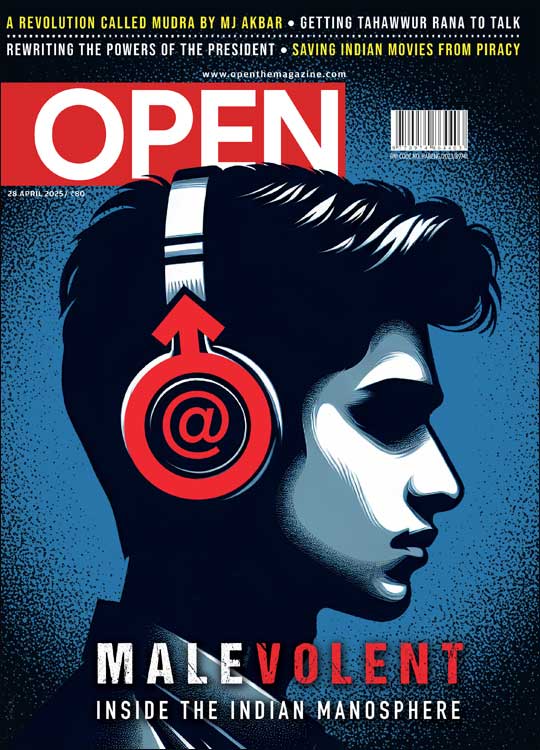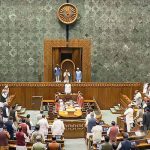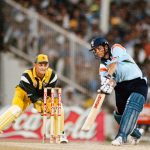The Light of Benares
Modi, if he is to bring profound change, must not go the Erdogan or Rajapaksa route. Because the conditions for the emergence of that kind of leader do exist in India
 Aatish Taseer
Aatish Taseer
 Aatish Taseer
Aatish Taseer
 |
08 May, 2014
|
08 May, 2014
/wp-content/uploads/2015/11/Aatish-light-Benares-main.jpg)
Modi, if he is to bring profound change, must not go the Erdogan or Rajapaksa route. Because the conditions for the emergence of that kind of leader do exist in India
This is the last despatch. On Monday, Benares goes to the polls. The next issue of this magazine will appear with the 14th Prime Minister of India on its cover. And then when there are only certainties, only known knowns, there will be little for me to add.
It will be a relief. This election has gone on too long. There is, in Benares at least, a great feeling of fatigue. We peaked early. This last week has been unendurable. The white heat is here; the afternoons burn; in the evening, the river is still and swampy. The climate
combined with stray incidents of electoral violence and the heavy presence of commandoes, sniffer Alsatians and intelligence men has given this temple town the air of a Latin American country under curfew. The other night, returning from Yelchiko Bar with some friends, we encountered a street full of policemen and journalists. The electricity had gone and the street was in total darkness, but for the halogen of a TV camera and the revolving blue light of a police jeep, flashing its beam into the smoky night. An AAP worker had been beaten up a few hours before, his face bloodied; he was there to lodge an FIR. The city was tense. And, as Open goes to press, Modi was preparing for a confrontation with an Election Commission that had, for ‘security reasons,’ denied him permission to hold rallies. There was talk of protests and the muted fear of pre-poll violence.
It was time to go. I felt I had seen about as much of this election as I wanted to, and now it was time to go. Time to finish up my real work and find a flight out.
This election began for me with a Modi rally in Delhi last September. I was struck at the time by a number of things. These are my impressions from that day:
‘So, yesterday, P— and I went to the Modi rally in Delhi. A hot unpleasant day of barsaat vaali dhoop. We got there far too early. To the Japanese Park in Rohini, a dengue-infested wasteland in West Delhi. We had to sit there for a long time in the press enclosure among mainly cub reporters and Hindi language journalists; there were no senior journalists present and almost no one from the foreign press. And, in the beginning, the crowd felt small too. In fact, it all felt pretty lacklustre: the packaged breakfasts, the oppressive heat, the endless slogans—Bharat Mata ki… Jai!—the campaign videos playing on a loop and the young woman with the screechy voice who kept trying to enthuse the crowd. At one point, we even considered leaving. (Not a loo for miles, by the way!)
‘And then, just as P— and I were getting pretty restless, the strangest thing happened. The sky darkened. A cool wind began to blow, and the temperature seemed to drop by several degrees. A long narrow poster of Modi tied to the metal frame of the tent came free and began to blow in the wind. But in such a way that it seemed—because of the little ripple that [ran] through the poster—that Modi was waving at us. In fact, many people from the press corps—you know how India loves a bit of magic!—got up and began to photograph this strange phenomenon. Not just because on this day of ‘chamchamati dhoop’ it was suddenly cooler, and the glare from the sky was gone, but because this apparition of the leader seeming to wave at the press enclosure coincided exactly with Modi’s arrival on stage! And when I stood up on my chair to see the reaction of the crowd, it was not so small. Not small at all, in fact. They had been arriving all the while, and for as far as I could see, down the full length of the long tent and spilling out on all sides, were hundreds and thousands of people. All of a type, by the way. No longer the people who attended the rallies of my childhood, no longer people with leathery skin and yellowing eyes and bad teeth. But all young people, mainly men—all slightly built, but very energetic— in jeans and sneakers, with fashionable haircuts. Don’t get me wrong: they were not, by any means, all middle-class. But it was clear, from their restlessness more than anything else, that they were all certainly planning to be. And when Modi began to speak, after the interminable bugling of a conch and cries of ‘Bharat Mata ki…’, what he seemed really to catch was this feeling, at once full of sorrow and rage, of hopes betrayed, of a kind of wasted promise. It was as if he spoke directly to the crowd’s restlessness, and rather than making them feel ashamed of it, he endowed it with a kind of nobility. He made their restlessness and hunger and wish to make something of their lives seem like the noblest impulse a man could possess. He showed them their anger in the light of a government that held their talent and energy and potential in contempt. It was amazing: his belief in that vast crowd’s ability to empower itself was absolute.
‘He began in humour. And this is [rare]. This is not a funny country: there are very few political leaders who can really make people laugh. “The Prime Minister is in America at the moment,” he said, embarking on a cruel impression of the PM. “He is grovelling before Obama. He is telling him that we are a poor country, and that America should help us. “‘We are,’” he went on, in a weak plaintive voice, “‘a nation of 125 crore, but we are poor. Please help us!’”
‘Then, referring to Rahul Gandhi’s comment the other day—and he only ever refers to him as ‘shahzada’—that poverty is “a state of mind”, he said: “Now what I want to know is: Is this poverty that the Prime Minister is asking Obama to alleviate real? Is it the poverty of our streets and neighbourboods? Is it real poverty? Or is this also that state-of-mind poverty?”
‘And for many minutes, this was all that he did. He just made us laugh, at the expense of the discredited PM, and The Madonna with Child.
‘But then—and one could almost not tell when it happened— all the humour fell away. And he was angry. Full of this emotion that I now think of as distinctly his: this mixture of pain and sadness edged with great anger. It is also in these moments, when he is most rousing—imploring the crowd to tell him how the Prime Minister of Pakistan would dare insult the Prime Minister of India (Nawaz Sharif had likened Manmohan Singh to a ‘dehaati aurat’ in New York)—that Modi is also most frightening. Not Hitler, but there is definitely something of a leader like Erdogan in Turkey or Rajapaksa in Sri Lanka about him.
‘… His victory will decimate the opposition. Not just in terms of numbers, but philosophically too. It will be a long time before the Congress finds its way again. The [pundits in Delhi] will say I’m wrong. How will he find the numbers? they ask. But the numbers will come. This is going to be one of those elections when all the old calculations cease to apply.’
That was September. Much of what was relevant then is, if anything, more relevant now. At the time I could not have known if the crowd I had seen in Delhi was representative of the electorate at large, or specific to the big cities. It is my feeling now—after many weeks of travel, and seeing Modi in other more rural places—that this is the new electorate. And, if I have sympathy for Modi, if I wish to see him succeed, it is because of my sympathy for the people who support him.
It is this India—clear-headed, restless, hungry—that has energised this election. It is the India that some of us have been waiting to see come into being.
It is also my concern for this India that has prejudiced my view of this election. The reason is that I grew up among a class of Indians—privileged, exclusively English-speaking, intimately connected to power and politics—who loathed this other India. They turned their nose up at their bad English; they complained of their body odour; they described them, while doing an impression before a hooting drawing room of people (I’m thinking now of a large mondaine of Delhi society) as ‘ball-scratchers.’ They hated their beliefs and practices; they held their religion in contempt; they lived in open terror of their rise.
Only the Poor were beautiful. The people I grew up among had great reserves of feeling for the rural poor. And through their many schemes and yojanas, their fraudulent plans for empowerment, their concern for tribal art and religion, this crowd of ethnistas and Oxbridge Lefties worked hard to make sure that the Poor never lost the thing that gave them their great charm, namely their poverty. Now while it would be unfair to say that the members of this class supplied leaders exclusively to the Congress party—many of them went on to join other parties, some even to lead large states—it would not be an exaggeration to say that if one party were to be singled out as sharing the beliefs and prejudices of this class, it would be the Congress Party under the leadership of the Gandhi family.
But the class the Family represented was a class in decay. That decay, though they were an embodiment of it, was not specific to the Family. The same conditions that had produced them had produced others. Their experience of rootlessness and isolation, the devastating impact of convent and public school education—some wasted time spent in the West— was a general feature of this class. And the decline that was to be observed between Jawaharlal Nehru’s generation and Rajiv Gandhi’s was visible everywhere. No one perhaps expected that it would have brought us so soon to Rahul Gandhi; one might be forgiven for thinking an intervening stage was needed; but decline itself was inescapable. It is not possible for a class to remain vital if it cannot draw cultural nourishment from the place it inhabits. That class then will produce people without the means to deal with India; it will produce Coomaraswamy’s intellectual pariah, ‘the nondescript superficial being’ who is neither of the East nor the West. A few among this class, I should say, did try to make a journey back; they tried to undo the effects of their education; but most were content to remain as they were. And why not! It was not so bad a place to be. India did not punish them for the remove at which they stood from her; she rewarded them with her awe.
Well, that is, till just the other day.
Because the sense I had at that rally in Rohini—then subsequently, in Kanpur, and then again, here, in Benares— was of a country unbound. A country coming free of its historical obeisance to the class the Gandhi family represented. The change was happening not because the new middle classes sensed the danger the elite posed to their own growth. No: it was much more basic than that. It was that the cultural gap had finally grown too wide. And if they turned away from Rahul Gandhi, it was not because they saw him as a threat to their own interests, it was because they couldn’t understand a word he was saying. In the past, this might have produced a feeling of apology in them; it now produced an equal and corresponding feeling of contempt.
It was there in the voice of a young priest who came to see me the other day. He was of a grand line of priests belonging to the Kashi Vishwanath Mandir. He wore jeans and a kurta, pink-stemmed rimless glasses; his ringtone was: ‘Yada yada hi dharmasya…’ There were broad streaks of yellow on his forehead, pierced red at the centre, and he wore a ring of Hessonite, for his Rahu was bad. We had not met to discuss politics. But the young priest, after making apologies for being apolitical, as men of God frequently do, could talk of nothing else. Of Modi, he said: “Rahul Gandhi se toh zyaada sincere hain. Kam se kam unko bataana toh nahi padhha ke yeh Vishwanath hain. Rahul Gandhi ko bataana padhha ke yeh Vishwanath hain.” Then, as if coming to the heart of the difference between the two men, he said Modi knew how to perform all the rites at the temple. “Rahul Gandhi,” the priest added cruelly, “toh sona-chaandi dekh rahe thhe. Unko toh Vishwanath se koi matlab hi nahi thha.”
This was what was new this election. In another time, Rahul Gandhi would not only have been forgiven his deracination; he would have been admired for it.
But cultural rootedness came with problems of its own; in fact, it came with the problems of that culture. And, likeable as the priest was, he was an effortless bigot. He lamented the fact that all of India’s Muslims had not been sent to Pakistan in 1947; he spoke of the need, when Modi came to power, for one decisive riot that would show Muslims their place. To hear him speak was to be reminded of how dangerous it was to romanticise one India over another. It was also to be reminded of the man the priest supported this election, the man from whom such a wide range of things were expected.
Modi, that day in Rohini, when I first heard him speak, had said a few things that worried me very much. He said that at that same breakfast in New York where our Prime Minister had been insulted, some Indian journalists had been present. Would they, he thundered, those journalists, be answerable to the people of India for why they had been eating Nawaz Sharif’s breakfast while their Prime Minister was being insulted?
What he said was worrying not just because no one wants to live in a country where a journalist should ever be answerable to anything as vague as ‘the people of India’. But, more than this: had a journalist, on returning to India, been attacked because of what Modi said, it would have done a lot to change the mood in this country. I had been in places where such a change of mood had occurred, and it was a very ugly thing. No press freedoms would need to be reeled in; the change of air was often threat enough. But, more than all this, what really worried me about what Modi said that day was that it suggested a certain kind of man. Whose principal crime, in my eyes, is not so much that he is a bigot, but a provincial.
The provincial is a problem not because you can’t have a glass of wine with him, though that would be nice too. Nor is it simply that he is not a man of the intellect—not a reader, not someone of subtle mind. The provincial is a problem because his plan for Development, on which his entire fame rests, often ends up being too shallow a plan. Too limited in its scope. The provincial invariably fails to recognise that in the great countries—let us take Japan as an example—the development of infrastructure and the economy must, if the country is to rise in a meaningful way, and not stumble a few years down the line, be accompanied by an atmosphere in which the human spirit is given free rein. There is no external development—and India, more than any country, should know this—without a parallel development in the internal life of a country. And for this to happen, for a country to find her voice, a sense of her destiny, as it were, there must exist an environment of complete freedom. Not simply in legal terms, but in mood, in atmosphere. It cannot be impinged upon by a leader speaking the language of treason, or leading witch- hunts against journalists and intellectuals.
Modi, if he is to bring profound change, must not go the Erdogan or Rajapaksa route. Because the conditions for the emergence of that kind of leader do exist in India. There is the malaise left behind by the previous government; there is a loud majoritarian feeling; there is disgust with the elite; and there are people baying for a strong leader. It is very easy to imagine an India in which Modi, if he delivers on Development, will be forgiven everything else. And anyone with a harsh word to say about him will be driven out of town. It would be terrible if that atmosphere were allowed to grow in India. The trouble would not come in the first five years, when, after the stultifying experience of UPA II, there is nothing but euphoria. It need not even come in the second term. The trouble comes only when that limited kind of Development, restricted only to infrastructure, runs, as it must, into the sands. It is then that the provincial leader, if he has not grown into a statesman, asserts himself in cruder ways, waging cultural or class wars, stifling freedoms.
It is an illusion of our age that Development no longer requires an intellectual component. True, one kind of Development will come easily—there are companies to do it; people are pleased; they think their work is done. They are wrong. The world can be divided along the blade of a knife into those countries where Development has come in shallow ways—in many, it is possible already to see the ruins of partial modernity—and those in which it has been accompanied by achievements in the Life of the Mind. And Development that is not profound can play dangerous havoc in countries like ours.
Modi, if he wins this election, stands not just to be the Prime Minister of India, but the MP from Benares. It is a configuration full of suggestiveness; there is no grander place on earth to be the MP from. All around him, if he looks well, he will see the remains of tremendous intellectual achievement in need of new vitality. Modi must not look away from the spirit of enquiry and freedom that was at the heart of that achievement. He must take as his maxim what one very wise Brahmin here told me it had been his life’s ambition to be: “A Hindu without vengeance, and without apology.”

/wp-content/uploads/2025/04/Cover-Manosphere.jpg)











More Columns
Political parties echo anti-Pakistan sentiment after Pahalgam massacre Open
Indus treaty first step as India plans major retaliation Rajeev Deshpande
April 24 - Sachin Day Aditya Iyer